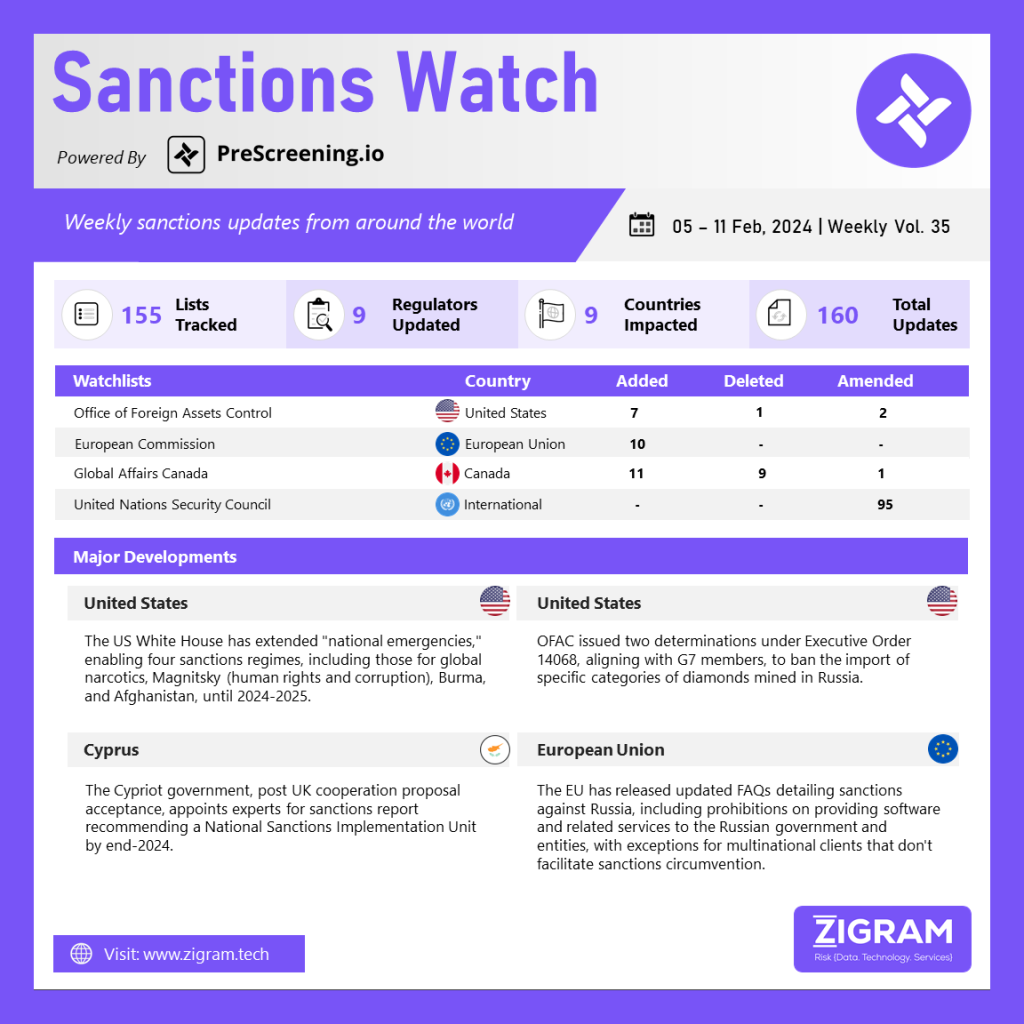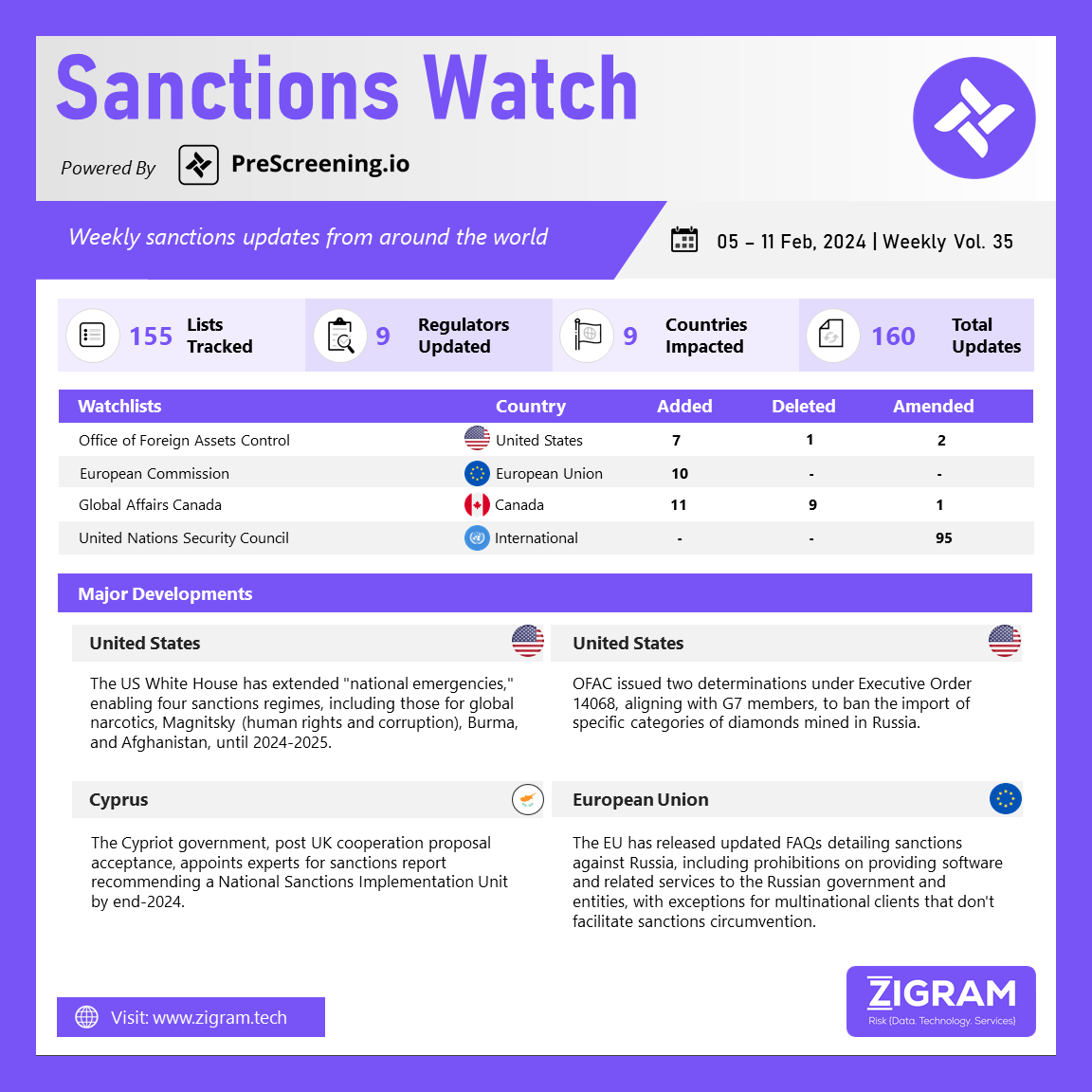Published Date:
In the latest edition of our Sanctions Watch weekly digest, we present significant updates on sanction watchlists and regulatory developments.
The White House of the United States has extended the declaration of “national emergencies,” reauthorising four sanctions frameworks. These include the global narcotics sanction, effective until December 2024, aimed at combating drug trafficking worldwide. Additionally, the Magnitsky Act, focusing on human rights abuses and corruption, has been prolonged until December 2024 to address ongoing violations. Furthermore, the sanctions pertaining to Burma, slated to counter specific concerns within the country, have been extended until February 2025. Similarly, the sanctions targeting Afghanistan, designed to address critical issues within the nation, have been prolonged until February 2025. This reissuance underscores the continued commitment of the United States to address pressing global challenges and uphold principles of human rights and international law through targeted sanctions and diplomatic efforts.
In accordance with Executive Order 14068, the Office of Foreign Assets Control (OFAC) has issued two determinations regarding the importation of certain categories of diamonds mined in Russia, aligning with actions taken by other G7 members. The first determination, made under sections 1(a)(i)(A), 1(b), and 5 of E.O. 14068, as amended by E.O. 14114, prohibits the importation of Russian-origin diamond jewelry and unsorted diamonds. The second determination, under sections 1(a)(i)(D), 1(b), and 5 of E.O. 14068, extends this prohibition to Russian-origin diamond jewelry and unsorted diamonds that were exported from Russia. Consequently, the importation and entry into the United States of these products, including for admission into foreign trade zones, is prohibited, unless authorized by law or by the Office of Foreign Assets Control.
In May 2023, upon accepting a proposal for cooperation and technical assistance from the United Kingdom, the Cypriot government took action by appointing a project manager and a team of experts. Their task was to compile a report on sanctions, aimed at enhancing the nation’s sanctions legislative framework. The report recommended the formation of a National Sanctions Implementation Unit and suggested measures to bolster the existing framework. As per the proposed timeline, the establishment of this Unit is slated to be completed by the conclusion of 2024. This collaborative effort signifies a proactive approach by the Cypriot government to fortify its capabilities in implementing and enforcing sanctions, underscoring a commitment to international cooperation and compliance with regulatory standards.
The European Union has recently released updated Frequently Asked Questions (FAQs) regarding the sanctions imposed on Russia, particularly concerning software. These FAQs delineate various prohibitions, such as the ban on supplying software to the Russian government and affiliated entities, along with associated technical support, brokering, and other services, including software updates. Moreover, the document specifies the categories of software affected by these restrictions, encompassing enterprise management systems, design, and manufacturing software, among others. Notably, while the sanctions prohibit direct provision to Russian entities, EU operators are permitted to continue supplying software to multinational clients with diverse global subsidiaries and affiliates. However, this allowance is contingent upon ensuring that such transactions do not facilitate the circumvention of the imposed sanctions.
- #UnitedStates
- #Russia
- #NationalEmergencies
- #DrugTrafficking
- #Afghanistan
- #OFAC
- #G7
- #Cyprus
- #UnitedKingdom
- #EuropeanUnion
- #SanctionsWatch
- #RegulatoryCompliance
- #TradeCompliance
- #SanctionsEnforcement
- #SanctionsMonitoringBoard
- #RegulatoryObligations
- #SanctionsBreaches
- #Compliance
- #FAQ


